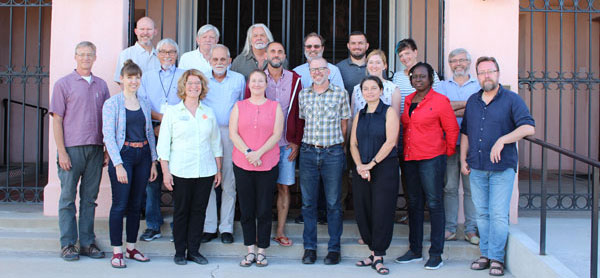Ragsdale Joins International Committee to Study Human Migration
 When Corey Ragsdale, PhD, assistant professor in the Southern Illinois University Edwardsville Department of Anthropology, learned about the newly developed Coalition for Archaeological Synthesis (CfAS) on human migration, he jumped at the chance to participate. For the first time in the field of anthropology, this committee is bringing together a group of eminent scholars from around the world to tackle migration issues that are important in the world today but are not addressed thoroughly in academic study. Through a highly competitive application process, Ragsdale was selected as one of the youngest of 15 committee members from the United States, Europe and Africa.
When Corey Ragsdale, PhD, assistant professor in the Southern Illinois University Edwardsville Department of Anthropology, learned about the newly developed Coalition for Archaeological Synthesis (CfAS) on human migration, he jumped at the chance to participate. For the first time in the field of anthropology, this committee is bringing together a group of eminent scholars from around the world to tackle migration issues that are important in the world today but are not addressed thoroughly in academic study. Through a highly competitive application process, Ragsdale was selected as one of the youngest of 15 committee members from the United States, Europe and Africa.
“My academic interests are strongly tied to population movements, mainly migration and mobility in the past, but I am also interested in migration in a non-academic sense,” explained Ragsdale. “We live in a world of mobility. People move short and long distances, in small and massive numbers, willingly and through various pressures. Yet, we as scholars, and generally the masses, don’t truly understand the reasons and potential effects of these movements, and how today’s migration patterns relate to those that have occurred in the past. I chose to participate in the first, new and exciting initiative to learn more about things near and dear to me.”
The committee’s inaugural workshop was held at the Amerind Institute in Dragoon, Arizona, in October. Over the course of four days, Ragsdale and his colleagues examined the issues concerning migration and developed three projects on topics that have an urgent need for evidence-based answers to support public policy. Committee members will work in teams during the next three years to develop outcomes for these projects.
“We all hope, collectively, that by examining migration and mobility through the lenses of various realms of expertise among global leaders in the field, we can use knowledge of migration in the past (both recent and deep past) to inform about events occurring in the present,” said Ragsdale. “This coalition is not only innovative, but also ambitious, and I am excited to be a part of it.”
Ragsdale will serve as the sole bioarchaeologist and biological anthropologist for one of the three projects, contributing genetic, skeletal and dental data and studies to help examine the effects of migration on human securities, such as food security, of both migrant and receiving populations. Over the next three years, Ragsdale and his team will study these effects globally as far back as 1 million years. They will look at how these effects differ within political, environmental and social parameters.
In addition to his primary project, Ragsdale also will support the work of the CfAS team dedicated to examining frequencies of migration over time. He will serve in a consulting role on this project, providing data and other expert resources to the study.
Ragsdale’s involvement with the CfAS directly aligns with SIUE’s emphasis on the “teacher-scholar” philosophy, meaning that an ongoing commitment to scholarship enriches a faculty member’s excellence in teaching and service.
“My involvement with the CfAS has already and will continue to improve my own understanding of things that are important within my field of anthropology,” added Ragsdale. “To me, it is also difficult for me to have the confidence to educate others (students, or the public) in something I am not actively engaged in on a scholarly level. My courses at SIUE benefit from my experience and knowledge in the field, and an increasingly important phenomenon such as human migration is no exception.”
Photo: Corey Ragsdale, PhD, assistant professor in the Department of Anthropology (third row, second from right), is pictured with the Coalition for Archaeological Synthesis on human migration and its organizers during their October workshop.
Filed Under: Anthropology • Faculty News












